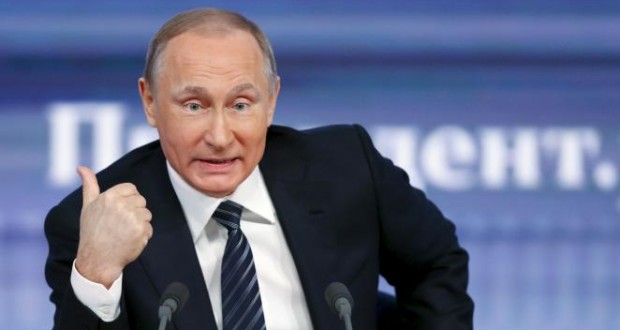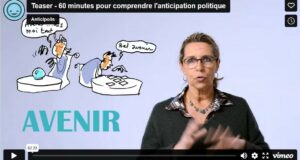We are risking a bold anticipation here, but at least does it provide an interesting angle on the EU’s most important issue since 2014: the dramatically decaying relationship with its closest and most powerful neighbour, Russia.
Moreover, as mentioned in our Manual of Political Anticipation[1], the anticipatory exercise consists of “thinking the unthinkable”… and bringing out arguments.
Several considerations, the first one being that the Russian intervention in Syria is a major game-changer, lead us to the following hypothesis:
“By the beginning of 2017, Vladimir Putin will announce early presidential elections in which he will not be running.”
Here is a list of facts and considerations which have led us to make this assumption.
The game-changer of the Russian intervention in Syria
The Russian intervention in Syria has been a success for several reasons. First of all, it is a rare case of a military flash-operation, inducing a ceasefire after a few weeks only to a five-year long conflict, followed by a nearly complete withdrawal of the Russian military from the intervention area. Of course, the truce of February 27 is fragile and somewhat relative. Assad’s regime started a series of air strikes in Aleppo, seriously challenging this truce for two weeks, but the Americans and Russians are uniting in order to resurrect it[2]. IN any case, the truce actually lasted eight weeks, while the commentators didn’t give it one week when it was signed.
The reversal of the situation caused by this intervention turned Russia into a credible force of reorganization in the Middle East (as seen in the article on “The method change” in this very bulletin): the Doha meeting particularly owes much to Russia; Russia is now seen by many regional players as a positive game-changer[3]; even Turkey, in the aftermath of its EU emancipation, could find possibilities of restoring its relations with Russia.
Moreover, with the Ukraine on the table and while Syria was providing a new conflict area for Russia and the United States, the Russian intervention forced the Americans to get involved to avoid looking as if they were losing hand. Getting Russia and the US, shoulder to shoulder, on a military strategy in Syria is quite a tour de force… owing a lot to Obama’s intelligence also.
Finally, from the EU perspective, there is no doubt that the Russian intervention was welcomed with a sigh of relief as the migrant crisis was badly rocking the boat of European public opinion. Even if our media is trying to make us believe that the reduction of the flow of migrants is related to the EU-Turkey[4] agreement or NATO’s presence in the Aegean Sea[5], it is because they would prefer that to a more simple truth: that the lull in the conflict allows the Syrians to remain at home.
Russia’s remarkable come-back on the international stage provides an ideal window of opportunity for Vladimir Putin to leave the Russian presidency standing tall.
A relative improvement in the Ukraine as well
In 2015, Europeans and Russians certainly failed to solve the Ukrainian crisis, but at least they managed to freeze it. Since then, nothing much happened. But recently, a significant event took place with the resignation of Prime Minister Yatsenyuk[6] the most violently anti-Russian member of the government… and a good friend of Victoria Nuland, this great American diplomat well-known for her resounding “F… the EU!” in 2014, but also for her conversations with the US Ambassador in the Ukraine during the Maidan case, mentioning “Yats” as a member of the next government[7]. This resignation can indicate a longing to ease relations with Russia, but in any case it certainly provides the opportunity for that.
The urgent need to restart the EU-Russia dialogue
We have often said that the context of tension strengthens Putin’s position… and forces him to stay in place: it is not wise to change players during a game. The window of opportunity, provided by the undeniable cooling off, allows to consider a change aiming to unfreeze the relations between Europe and Russia. We estimate that both the European and Russian sides regard this unfreezing as a major objective:
. Both economically and strategically, it is a disaster for Russia (even if Russians don’t show it) to be cut off from its European pair, but Russia will not lay down arms; it is as a totally free and independent country that it must find ways to become compatible with Europe again
Figure 1 –Russia’ trade balance, and yearly exports (red) and imports (blue) evolvement, Feb 2014-Feb 2016. Source: Focus Economics.
. For the EU, the great dangers following the disagreement with Russia in Eastern Europe and the Balkans, the resulting strengthening of the US military presence in various parts of its territory, and the obvious economic loss resulting from the amputation of its Eastern flank, all combined with the fact that the friendship with Russia is still alive on both sides of civil society, bring to the conclusion that the perpetuation of the current situation is absurd. Europeans will jump on the first occasion to re-establish dialogue with Russia
The European public opinion is ready
With few exceptions (the Baltic countries and Poland, maybe), the European public opinion has not bought the anti-Russian hatred. The focus occurs around the character of Putin, but in a very polarized way, in fact: on the one hand, there are those who see Putin as a dictator; on the other, those who see him as a great politician, in line with politicians like Churchill or De Gaulle, the kind of leaders they would like to see in Europe again. Needless to say, the political leadership model embodied by Putin in Western Europe is not to the taste of everybody in Europe.
The desire to return to normal terms with Russia is fairly strong in many EU countries: in Italy, Matteo Renzi has clearly worked in this direction for a long time[8]; in France, the National Assembly voted recently to lift sanctions[9]; the Netherlands have voted “no” to the free trade agreement with the Ukraine, clearly expressing their desire not to see relations with Russia deteriorate further[10]; in Eastern Europe, the Czech[11], Slovak[12], Bulgarian[13], and Hungarian[14] governments have asked for a restart of dialogue.
China and the BRICS in the background
On the BRICS side, the banning of Russia, as we have seen many times, is a serious blow to all the efforts of compatibility between emerging powers and the West. The BRICS have found themselves significantly weakened. The hypothesis formulated by LEAP regarding the need for a strategic Euro-BRICS rapprochement by 2015 was shattered in 2014, along with prospects for the emergence of an organised multipolar world, in favour of a more Chinese global governance reform agenda, on a direct line to future confrontation with the United States. Suffice it to say that China and the BRICS certainly do not see clearly the Euro-Russian dispute, and China and the BRICS have become key partners to Russia. The objective of creating the conditions for a relaxation of tension is enhanced, maybe even asked directly, by these new allies of Russia. The BRICS are indeed the guarantee that Russia will not retreat into a national prideful reaction, rather improper from a global perspective.
A borderline economic situation
Russia is putting a smiling face on its economic situation, but it really is starting to suffer from those outlawed trade flows with Europe, from the increase in military spending (+ 21% in 2015) and from the fall in oil prices[15]. Despite the latter, the country managed to not trim its international reserves too much thanks to a clever policy of diversification of funding sources imposed by the Central Bank of Russia, but the CBR’s monetary policy weighed heavily on consumers and citizens[16]. The devaluation of the ruble created a galloping inflation which considerably reduced the standard of living of the middle class that was emerging until 2014. Like Saudi Arabia, it has to undertake a major reform of its economic programme to reduce its dependence on energy exportations and raw materials.
This month, the Ministry of Finance had again reached into the Reserve Fund to finance the $5 billion budget deficit of the country, bringing the Fund from 50 to 45 billion. The Reserve Fund is an essential deficit damper, the collapse of which, at current rates, could lead to annihilation by the end of the year[17].
Figure 2 – Russia’s Reserve Fund, in trillions of rubbles, June 2015-May 2016. Source: economy.com.
The military spending is weighing heavily on the deficit, of course, and the soothing of Euro-Russian relations would be an important angle of deficit management; the other angle, of course, would consist of cuts in the welfare system expenditures, undermining the stability of the country and forcing the government to tighten domestic policies, while putting the country’s democratization perspectives on hold.
Putin’s character at the heart of the problem
Whether we are for or against Putin, and whatever we think of his strategic skills, one thing is certain, he is the heart of the problem. Coming from Cold War times, he is one of those leaders who, like Rousseff, Cristina Fernandez, and Nicolas Maduro, are certainly symbols of the transition from one century to another, but also the avatars of fights of the past. In short, Putin reminds too much of the KGB to fulfil the transition he himself triggered. To fluidify the multipolar relations, representatives of major national players must present a decidedly twenty-first century image. This is what it takes to cut the grass under the feet of all those who try to resurrect the demons of the last century: overcome the past… being careful nonetheless not to forget it.
Russia will not become compatible with Europe and the West again as long as Putin continues to be its image, but Russia, as we have said, will not yield to force; voluntarily and under its own conditions this country must, at some point, create a surprise which will catch everyone unaware. We believe the conditions are almost ripe for this to occur.
The US future is uncertain, too
Of course, these conditions are fragile. That said, as uncertainty about the US foreign policy in the next presidential term prevails, as we have seen, a lot of players are adjusting their positions, reason why we anticipate that 2016 will be rich in structural transformations. That is also why we think the sudden change in Euro-Russian relations must take place before the next US president comes into office (i.e. January 2017). After that things can really start getting nasty, potentially forcing Putin to remain another term in power… leading Europe and Russia in a real Cold War.
The next presidential election seems too far away
The next Russian presidential election is scheduled for 2018[18], much too late if we take into account the constraints which were outlined above. That said, all the better: the effect generated by the announcement that Putin will not run in the election will be stronger in the case of early elections. The same announcement in the normal electoral calendar might suggest that Putin would expect to be beaten. Early elections, depending on his decision, will leave no doubt about the reality of his deliberate intention to leave power, especially at a time when the polls are as favourable to him as now[19].
Figure 3 – Putin’s approval rating in Russia, 1999-2016. Source: Rosstat
Of course, early presidential elections cannot take place before the parliamentary elections planned for September[20]. These elections by the way provide the framework of a political expression likely to be exploited for the purpose of announcing early presidential elections.
Visible mobilization indicators in this direction
Right now, it is time to look at what clues might show a mobilization in this direction.
And we find rumours of “purge” which would be conducted by Putin in the Russian political system[21]. That would make sense, considering what has been stated above: Putin will not pass the hand should there be any risk that power will go to a vassal of the West.
Furthermore, the holding economic conferences gathering a variety of specialists (experts, opposition, left wing, the ruling party) of the country, seems to indicate a desire for reform in this area[22].
The parliamentary elections of September provide the framework for new experiences of democratization[23]. Earlier this year, the Duma passed a law requiring televisions to broadcast the debates of all candidates. Then in March, a famous human rights activist was given the directorship of the country’s electoral observatory.
The strengthening of security[24], seemingly meant to restrict possible street protests, may also belong to a series of measures to prevent any risk of internal destabilization right before the parliamentary elections and possibly early presidential elections too. Indeed, the stability of the Russian situation is essential for the implementation of this strategy, as we said before.
In seeking further, we even manage to find the idea of early elections[25] within the speech made in June by Alexei Kudrin[26]. Our readers might recall that this character was spotted by us long ago as a likely planned successor of Putin: a liberal reformer loyal to Putin, he is not a vassal of the West, but would provide a modern and Western-compatible face to Russia.
Putin: mission accomplished
Now let’s imagine the effect of such an announcement from Putin: cutting the grass under the feet of his critics, allowing him a well-deserved retirement, contributing to the entry of Russia into the next century (a Russia freed from any suggestion of Soviet rule, a recognized power, ready to play the role of a bridge between the Western powers and the emerging powers in cooperation with Europe)… Putin would remain in the history books as the strong leader having managed the transition period and having left the democratization issue to the heir of a stabilized and strengthened situation. This sounds like a perfect world. Yet, the chances to see this development set up are real, and they will be played out between October 2016 and January 2017. However, any unbalancing of the Russian position will challenge that perspective of soothing of relations and of restarting a peaceful future. Hopefully, the window of opportunity will not close too early.
[1] Source: Manual of Political Anticipation, by Marie-Hélène Caillol, Editions Anticipolis (2009)
[3] Sources: MorrocoWorldNews, 14/04/2016; Ennahar, 27/04/2016; Reuters, 10/05/2016; Reuters, 13/05/2016; Xinhua, 22/04/2016; Reuters, 12/05/2016, etc.
[5] Source: Greek Reporter, 11/02/2016
[6] Source : The Independent, 10/04/2016
[9] Source: La Tribune, 28/04/2016
[10] Source: Financial Times, 30/03/2016
[11] Source: Radio Praha, 14/08/2014
[12] Source: The Slovak Spectator, 03/06/2015
[16] Source: The Economist, 16/04/2016
[22] Source: me-forum.ru
[23] This article is a real ray of hope… and highly legitimizes our team’s thesis. Source: Frontera, 03/05/2016
[24] Source : Sofia Goble, 08/03/2016


 LEAP2040 Toutes les informations et archives Europe2040
LEAP2040 Toutes les informations et archives Europe2040






